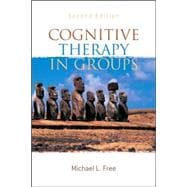
What is included with this book?
| About the Author | p. xi |
| Preface to the Second Edition | p. xiii |
| Preliminary Considerations | p. 1 |
| Introduction to the Program | p. 3 |
| The nature of the program | p. 3 |
| The search for effective, efficient and ethical psychotherapy | p. 4 |
| The nature of the therapeutic relationship | p. 7 |
| Overview of the program | p. 8 |
| Theoretical Foundations | p. 11 |
| Background to the theoretical basis for the program | p. 11 |
| A general model of disorders | p. 13 |
| Beck's cognitive model of emotional disorders | p. 13 |
| Ellis' Rational Emotive Therapy | p. 17 |
| McMullin's Cognitive Restructuring Therapy | p. 18 |
| Young's Schema Therapy | p. 20 |
| The English cognitive therapists | p. 21 |
| Conclusion | p. 21 |
| Preparation | p. 23 |
| Rationale behind the manual | p. 23 |
| Acquiring appropriate resources | p. 23 |
| Selecting participants | p. 26 |
| Preparing prospective participants | p. 27 |
| Assessment considerations | p. 29 |
| Understanding the group cognitive therapy manual | p. 30 |
| The role of the therapist in psychoeducational group therapy | p. 32 |
| Choosing a format | p. 33 |
| Treatment Manual | p. 35 |
| Surface Beliefs and Processes | p. 37 |
| Group Basics | p. 39 |
| Thinking and Feeling | p. 45 |
| Logical Errors | p. 53 |
| Appropriate Logic | p. 57 |
| Countering Logical Errors | p. 61 |
| Beneath the Surface: Exploring Your Negative Belief System | p. 67 |
| A Generic Model of Emotional, Behavioural and Personality Disorders | p. 69 |
| Identifying Negative Schema Content Using the Vertical Arrow Method | p. 77 |
| Advanced Vertical Arrows and Subjective Units of Disturbance | p. 83 |
| Making Sense of Beliefs: Categorising Beliefs and Making Cognitive Maps | p. 89 |
| Making Sense of Your Beliefs: Developing a Cognitive Diagnosis | p. 95 |
| Testing Your Beliefs | p. 103 |
| Beliefs Can be Changed and Adversarial Analysis | p. 105 |
| Challenging Your Beliefs: Investigatory Analysis | p. 111 |
| Scientific Analysis | p. 119 |
| Consolidation of Information | p. 131 |
| Changing Your Thinking and Feeling | p. 137 |
| Countering and Adversarial Debate | p. 139 |
| Propositional Perceptual Shift | p. 145 |
| Emotional Shift and Schema Content Shift | p. 149 |
| Schema Rebalancing and Schema Imagery | p. 155 |
| Negative Schema Imagery | p. 161 |
| Strong-Nurturing-Self Imagery, Re-parenting, Letter-Writing | p. 165 |
| Changing Your Counterproductive Behaviour | p. 171 |
| Selecting Behaviour to Change | p. 173 |
| Making a Behaviour Self-Change Plan | p. 181 |
| Problem Solving | p. 191 |
| Cognitive-Behavioural Rehearsal | p. 197 |
| Maintaining Gains | p. 201 |
| Appendices | p. 207 |
| Phone Screening Protocol | p. 209 |
| Intake Protocol | p. 210 |
| Information for Prospective Participants | p. 211 |
| Information for Referring Agents | p. 212 |
| Individual Work Contract | p. 216 |
| Overhead Transparency Templates | p. 217 |
| Worksheets | p. 335 |
| Handouts | p. 363 |
| Resources for Participants | p. 371 |
| References | p. 373 |
| Index | p. 375 |
| Table of Contents provided by Ingram. All Rights Reserved. |
The New copy of this book will include any supplemental materials advertised. Please check the title of the book to determine if it should include any access cards, study guides, lab manuals, CDs, etc.
The Used, Rental and eBook copies of this book are not guaranteed to include any supplemental materials. Typically, only the book itself is included. This is true even if the title states it includes any access cards, study guides, lab manuals, CDs, etc.